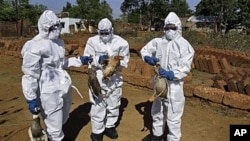A panel of the World Health Organization has recommended that research continue on a potentially lethal strain of bird flu so that scientists can better understand how the virus might trigger a global pandemic. The decision follows a U.S. government appeal last December to two scientific journals that they NOT publish key details of a federally-funded experiment that created new, more infectious strains of the deadly bird flu virus.
The H5N1 avian influenza virus originated in poultry flocks in Asia. While it has rarely infected humans, the illness carries a 60 percent mortality rate.
Scientists at the University of Wisconsin, Madison, and the Erasmus University Medical Center in the Netherlands engineered a more virulent strain of the H5N1 bird flu to try to understand how mutations could make it more infectious to both animal and human populations - a change that could lead to a global pandemic.
But a U.S. government panel on biosecurity, concerned that the mutated virus could fall into the hands of bioterrorists, asked two leading scientific magazines - Science and the British journal Nature - not to publish sensitive details of the work.
The magazines agreed and in January, the scientists voluntarily halted their research for 60 days.
In Geneva, the World Health Organization convened an emergency meeting of 20 scientists and public health experts to discuss the issue. Assistant Director-General for Health, Security and Environment, Keiji Fukuda said participants concluded there is ample justification for continuing the scientific research:
“In really helping us to understand better how these H5N1 viruses work, and also what are some of the changes we ought to be looking for out there in the real world, in terms of trying to keep on top of these viruses, which are becoming more dangerous in terms of causing a pandemic,” said Fukuda.
But Fukuda said the panel also agreed the research moratorium ought to continue for now, until all public health risks and benefits, as well as security fears, have been fully identified and addressed.
Fukuda stressed the research is being carried out in secure laboratory facilities, with little risk to the public.
The WHO panel also recommended that Science and Nature, for the time being, refrain from publishing articles about the research. The editors of Science said Friday they will honor the request.
Bruce Alberts, editor-in-chief of Science, said as a result of the work by the American and Dutch scientists, researchers now know how easy it is for the H5N1 virus to mutate, increasing the risk of a global pandemic.
“There’s every reason to suspect that in the natural environment, there will be such a [mutated] virus emerging. I mean millions of birds - I don’t know whether birds sneeze - but obviously the virus will spread better in birds, as well as better in people, if it can be transferred through aerosols.”
The WHO panel is recommending that research on the genetically engineered H5N1 virus be shared with scientists in all countries so they can begin developing drugs and vaccines, should a serious outbreak or pandemic of this deadly form of avian flu ever come to pass.
WHO Recommends Continued Research of Lethal Bird Flu Strain












